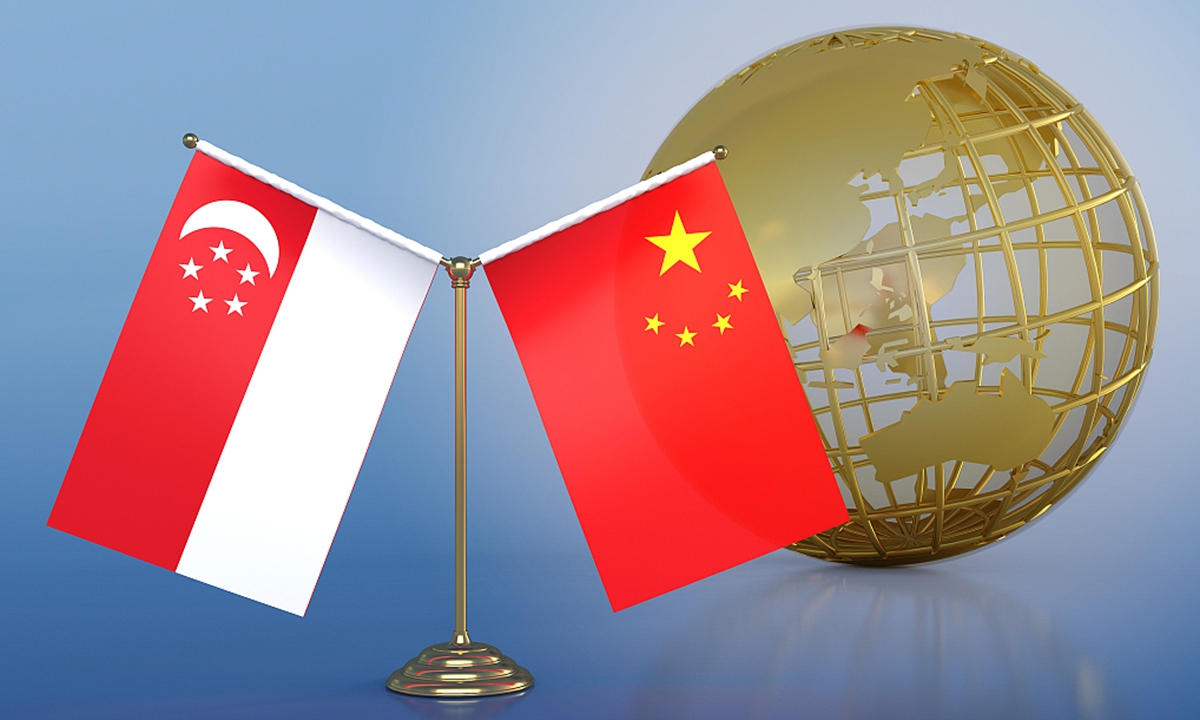2024年11月10日,华东师范大学亚太研究中心主任陈弘接受《环球时报》英文版采访,谈丁薛祥副总理访问新加坡与中新关系。
Chinese vice premier visits Singapore to lead series of bilateral cooperation meetings

China Singapore Photo:VCG
Chinese Vice Premier Ding Xuexiang is scheduled to pay a visit to Singapore on Sunday and Monday to lead with Singaporean Deputy Prime Minister Gan Kim Yong a series of annual high-level meetings on bilateral cooperation. Chinese experts said these cooperation mechanisms reflect the stability of bilateral ties, which is especially valuable in today's turbulent landscape, injecting peace and development both in the region and globally.
At the invitation of Gan, Vice Premier Ding, also a member of the Standing Committee of the Political Bureau of the Communist Party of China Central Committee, will visit Singapore from Sunday to Monday, during which they will lead the 20th meeting of the China-Singapore Joint Council for Bilateral Cooperation (JCBC), the 25th meeting of the China-Singapore Suzhou Industrial Park Joint Steering Council, the 16th meeting of the China-Singapore Tianjin Eco-City Joint Steering Council, and the eighth meeting of the China-Singapore (Chongqing) Demonstration Initiative on Strategic Connectivity Joint Steering Council, Chinese Foreign Ministry spokesperson Mao Ning announced on Friday.
At the invitation of Azerbaijani President Ilham Aliyev, Ding, as Chinese President Xi Jinping's special representative, will travel to Azerbaijan for the World Leaders Climate Action Summit on Nov. 12 and 13, Mao said, adding that Ding will visit Azerbaijan at the invitation of Deputy Prime Minister of Azerbaijan Shahin Abdulla oglu Mustafayev.
China and Singapore are friendly neighbors and important cooperation partners, and the two countries elevated bilateral relations to an all-round high-quality future-oriented partnership last year, Mao said.
"China stands ready to work with Singapore and take this visit and the mechanism meetings as an opportunity to strengthen strategic communication, deepen and expand cooperation across the board, deliver more benefits for the two peoples and promote regional prosperity and development," Mao noted.
Chen Hong, Executive Director of the Asia-Pacific Studies Center at East China Normal University, believes that Singapore, as an important member of ASEAN, plays a unique role in promoting peace, stability and development in the Asia-Pacific region. "Singapore has maintained an independent stance in its foreign policy, committed to upholding peace and stability in the region rather than blindly following US policies. This independent approach adds stability to the China-Singapore relationship," he told the Global Times.
The bilateral relationship serves as a model for China's relations with neighboring countries,Chen said.
The Sunday visit comes after Chinese Premier Li Qiang met with Singaporean Prime Minister Lawrence Wong on the sidelines of the leaders' meetings on East Asia cooperation held in Vientiane in October. "The frequency of exchanges fully demonstrates that since Singapore's new government took office in May, high-level interactions between the two sides have been ongoing, highlighting the importance that both sides have placed on bilateral ties,"Chen said.
The expert added that the JCBC, which has become a regular and institutionalized mechanism, indicates stability, which is particularly valuable in today's turbulent world. With ongoing conflicts in many parts of the globe and external countries like the US continuing to sow discord in the Asia-Pacific, stable China-Singapore ties not only benefit both sides, but the whole region's development, even the world's.
The JCBC meetings are the highest platform of mechanisms to coordinate cooperation between the two countries, which play an important role in deepening bilateral cooperation and advancing bilateral relations, according to Chinese Foreign Ministry.
According to a release on Saturday from the Singaporean Prime Minister's Office, this year marks the milestone 20th anniversary of the JCBC, "which will continue to chart the forward-looking cooperation between both sides."
In recent years, areas of cooperation between China and Singapore have expanded to include finance, technology, education and environmental protection, among others.Chen stressed that financial stability and technological innovation are currently key areas of China-Singapore collaboration.
With both being major financial forces in the Asia-Pacific, cooperation in monetary policy, financial regulation and other areas will contribute to regional economic stability. The two countries have also achieved significant results in educational cooperation, especially in joint projects on research and talent development.
At a media interview on October 30 ahead of Ding's visit, Deputy Prime Minister Gan, who is also the Minister for Trade and Industry, said Singapore is "seeing many things to learn from China today, including their technology, and know-how in the sustainability-related green economy."
Gan said the two sides will look at many of the new and emerging areas relating to sustainability, expressing the hope to work together with China in promoting zero carbon, including emerging green economy-related businesses. Collaboration on the digital front, such as on a digital payments system and digital trade documentation, will also be a key focus.
Liang Rui contributed to the story.